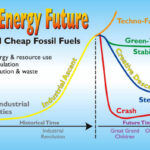4. Resilience-building businesses and industries
In the past 20-30 years, the concept of “outsourcing” has stripped most of our local communities of the butcher, the baker, and the candlestick maker – the craftsmen, merchants, and artisans who have skills and know-how to provide the basic goods and services we need for everyday living. Supporting our local businesses is essential, because with the transportation limitations that will come with the end of cheap oil, local will become our mainstay.
As we have outsourced basic industries like manufacturing, textiles, clothing, many of those small businessmen who do remain in our communities have turned to luxury industries. Small businesses in my own neighborhood include nail and hair salons, dry cleaners, high-end retail boutiques, and lots of restaurants – mostly things that we could do without, particularly as we trim our budgets with hard times.
Other small businesses currently in my neighborhood are linked to industries that we within the Transition movement know will disappear with the end of the oil age (car repair, car rental agencies, detailing shops, travel agencies, airport support services) and as the global economy crumbles (insurance sales and real estate agents). The few local merchants who do remain today are often reselling products from the globalized market. Businesses in these kinds of industries won’t provide much resilience within our community as the triple crisis unfolds.
How we can help
As local consumers, here’s how we can help the process: For starters, shift to buying local for yourself and your family, and create a Buy Local campaign in your community. Patronize your local farmers (farmers markets, CSAs). Vote with your buying dollar and support local businessmen rather than chain stores. (Why)
Then, use the new relationships you forge with these local businessmen and help them begin to grasp what lies ahead and the role of community resilience. You very well may find that they are looking for ways to replace lost business; they may be quite open to shifts in their product line.
If I shopped the plant section at the big box store, I would never have gotten to know Deno, my local nurseryman. He’s on our Transition mailing list now, and he attends our events when his schedule permits. His nursery now has in-ground vegetable plantings on display, and carries raised-bed frames for veggie gardens. They’re considering bringing in chickens, to which I said “Sell chicken feed!” We don’t have a feed supply in this area of the city, and his store could become a one-stop homestead shop.
Moving into the future
As we develop new industries within our local communities we would be wise to broaden our definition of “resilient” to include the ideas of the global justice movement – that peace, social justice, community, ecology and feminine characteristics are all part of the definition of the human condition and the “new operating system” of a wiser future. (ref Speth chapter “New Consciousness”)
It will probably build the greatest local resilience and flexibility if the new resilience-oriented businesses are set up to deal in a multiplicity of financial vehicles – local currencies and LETS credits, as well as U.S. dollars. (see Practical Tool #5)
Resilience-building businesses and industries are the wave of the future as far as new business opportunities, enduring livelihoods, investment opportunities, and community survival networks.
· Strategic Local Infrastructure http://transitionculture.org/2010/12/15/ingredients-of-transition-strategic-local-infrastructure/
· “The 200 Artisan Skills Required to Make a Victorian Town Functional,” Rob Hopkins (the comments are noteworthy, too) http://transitionculture.org/2009/01/22/the-200-artisan-skills-required-to-make-a-victorian-town-functional/
· BALLE (Business Alliance for Local Living Economies) http://www.livingeconomies.org/ – This organization understands portions of what we are striving for. They understand the need for local, and they understand much of the need for lighter environmental impact. We Transition groups will have to help them understand peak oil and the need to unhitch from the presumption of growth.
· Take the ideas of the “Declaration of Interdependence” of the B Corporations and go local. www.bcorporation.net
· See “social enterprise” at Practical Tool #6
· Lyle Estill, Small is Possible, an account of the unfolding process as businesses and neighbors in a small Southern U.S. town begin to transition from the conventional economy toward Relocalization. A bit of green-tech, but shows the evolution of community views.


